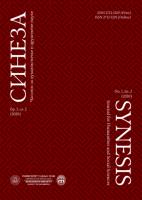Stavovi prema Romima u BiH i regionu: nalazi i perspektive kontaktne intervencije u obrazovnom kontekstu
Attitudes towards Roma in Bosnia and Herzegovina and the region: Findings and perspectives of contact intervention in the educational context
Author(s): Jovana ŠumanSubject(s): Psychology, Social psychology and group interaction
Published by: Filozofski fakultet, Univerzitet u Banjoj Luci
Keywords: Roma; prejudiced attitudes; social distance; direct interethnic contact; parasocial contact;educational environment;
Summary/Abstract: Previous research on interethnic tolerance in Bosnia and Herzegovina and the region indicates that majority ethnic groups have predominantly negative attitudes toward Roma. Research conducted on samples of primary and secondary school students also indicate that social distance is consistently most pronounced towards Roma, and “sitting in a school desk” with Roma students is usually the least acceptable relationship. Given that prejudices are often the result of insufficient knowledge of a particular group - the development of prejudices against Roma is facilitated by frequent spatial segregation that prevents the development of social connection and achieving a higher level of adaptation and social integration. Also, characteristic lifestyle and work, to some extent socially undesirable behaviors (begging, pickpocketing, human and child trafficking, etc.), minority status, skin color, different tradition – are some of the factors that contribute to the development and maintenance of stereotypes, prejudices, even discrimination (most often emotional and institutional). Ingrained prejudices and discrimination are often the cause of early school dropout, which is further manifested through low levels of education, unemployment, or exclusion from formal forms of work. These problems further lead to poverty, housing deprivation, hygienic and health neglect, premature pregnancies and marriages, etc. Given the presented factors that certainly affect the quality of intergroup relations - it is expected that negative effect of interethnic contact occurs more often in such environment. By including theoretical and empirical findings, efforts have been made to integrate strategies and recommendations that facilitate the development of positive, tolerant interethnic attitudes. When it comes to intervention based on direct interethnic contact in the educational multiethnic context, it is recommended to encourage intergroup cooperation during the achievement of common goals that are important for all groups, and also that groups should be in a situation of positive interdependence, without intergroup competition. Furthermore, the perception of equal status among groups, the encouragement of informal, personalized intergroup experiences, the emphasis of social norms that encourage the acceptance of diversity – are factors that are important, and in addition to quality, the frequency of contact is also important. Also, by stimulating certain mediation processes, such as empathy and taking someone else’s perspective, the perception of the heterogeneity of the external group - positive effect of contact on the suppression of social distance is facilitated. Therefor, when these preconditions are achieved in an educational environment, empirical findings indicate that this type of contact can be an effective tool in reduction of ethnic prejudice. Also, this article offers an overview of research that examined the effects of an intervention based on parasocial, media-mediated, contact, which indicate that the intervention of exposure to positive parasocial contact contributes to the reduction of social distance. Within this type of contact intervention, some of the most important preconditions are related to the accentuation of personal characteristics of member of a particular group, but also to the emphasis characteristics related to group affiliation; encouraging interactive discussion about the presented media content is an additional factor that contributes to the positive effect of this type of intervention. The hypothesis of parasocial contact proves to be especially effective if members of the majority group have limited opportunities for interpersonal contacts with members of minority groups in educational environment.
Journal: Sineza
- Issue Year: 1/2020
- Issue No: 2
- Page Range: 81-107
- Page Count: 27
- Language: Serbian

